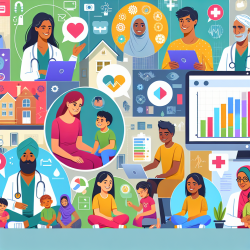Introduction
Health literacy (HL) is a crucial determinant of health outcomes, particularly in low- and middle-income countries (LMICs), where healthcare systems often struggle with accessibility and quality. A recent systematic review by Meherali, Punjani, and Mevawala (2020) highlights the effectiveness of various HL interventions in improving health outcomes in these regions. As practitioners, understanding and implementing these interventions can significantly enhance our service delivery, especially in online therapy settings like those provided by TinyEYE.
Key Findings from the Research
The systematic review analyzed 23 studies focusing on HL interventions in LMICs, identifying four main themes:
- Traditional HL Interventions: These include lectures, pamphlets, and health education sessions. While effective, their impact is limited by the general literacy levels of the population.
- Art-Based HL Interventions: Innovative methods such as drama, storytelling, and art activities have shown to be effective in engaging communities and improving HL.
- Interactive Learning Strategies: Group discussions and peer support programs empower participants to take charge of their health, leading to improved outcomes.
- Technology-Based HL Interventions: The use of digital platforms and mobile technologies is emerging as a powerful tool to enhance HL, though its application in LMICs is still limited.
Implications for Practitioners
For practitioners working in online therapy services, these findings offer valuable insights into enhancing service delivery:
- Incorporate Interactive Strategies: Engage clients through interactive sessions that encourage participation and ownership of their health journey.
- Leverage Technology: Utilize digital tools to deliver HL interventions, especially in regions where traditional methods may not be as effective.
- Adapt to Cultural Contexts: Tailor interventions to fit the cultural and literacy levels of the target population to maximize impact.
Encouraging Further Research
While the review provides a comprehensive overview of HL interventions, it also highlights the need for further research, particularly in the sustainability and scalability of these interventions. Practitioners are encouraged to contribute to this body of knowledge by documenting and sharing outcomes from their own implementations.
Conclusion
Improving health literacy is not just about imparting knowledge; it's about empowering individuals to make informed decisions about their health. As practitioners, integrating these research-backed strategies into our practice can lead to better health outcomes and reduced inequalities, particularly in LMICs.
To read the original research paper, please follow this link: Health Literacy Interventions to Improve Health Outcomes in Low- and Middle-Income Countries.










